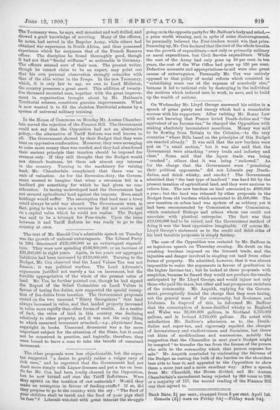The other proposals were less objectionable, but the super- tax
suggested "a desire to gratify rather a vulgar envy of rich men," and he regretted that the Government had not dealt more simply with Liquor-licenses and put a tax on beer. So far Mr. Cox had been loudly cheered by the Opposition, but he now tarned and rent the Tariff Reformers. Were they [toted on the tatittion of raw materials? 'Weald they make an exemption in favatn• of feeding-stuffs ? If so, did they propese to go to the country with the cry : "The food of tOne children shall be taxed, and the food of your pigs shall be free" P Liberals watched with gteat interest the struggle going on in the opposite party for Mr. Balfour's body and mind,— a prize worth winning, and, in spite of some discOuragement, he personally believed the Free-traders would win that prize. Summing up, Mr. Cox declared that the root of the Whole trouble was the growth of expenditure,—not only or primarily military or naval expenditure, but Civil Service expenditure. While the cost of the Army had only gone up 50 per cent. in ten years, the cost of the War Office had gone up 120 per cent. Defective accounts and appropriations-in-aid were also great causes of extravagance. Personally Mr. Cox was entirely opposed to that policy of social reform which consisted in "subsidising some one at the expense of somebody else," because it led to national ruin by destroying in the individual the motives which induced men to work, to save, and to build up the wealth of nations.










































 Previous page
Previous page